
Trouble Tour programme 1975

Trouble Tour programme 1975
Special thanks to James McCarraher (UK) for the "Trouble" tour programme!
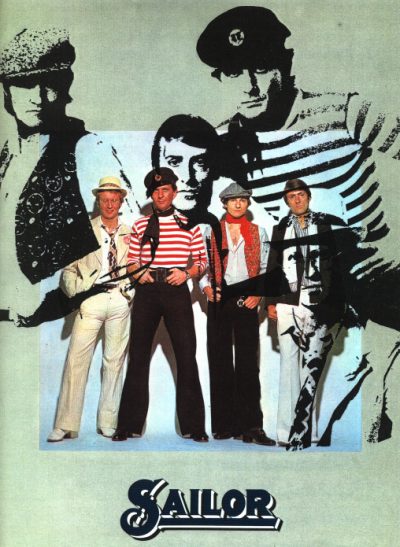
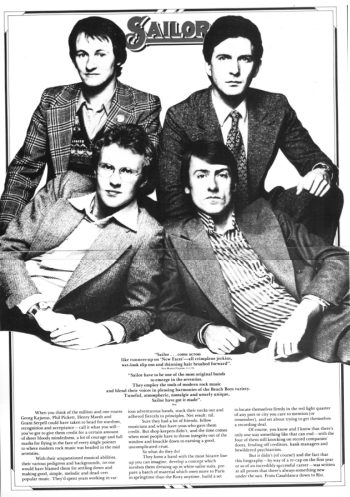
"Sailor
... come across like runners-up on 'New Faces' - all crimplene
jerkins, wet-look slip ons and thinning hair brushed
forward".
New
Musical Express, 11.1.75
"Sailor
have to be one of the most origin bands to emerge in the
seventies.
They enploy the tools of modern rock music and blend their voices
in pleasing harmonies of the Beach Boys variety. Tuneful,
atmospheric, nostalgic and utterly unique, Sailor have got it
made".
Disc
When you think of the
million and one routes Georg Kajanus, Phil Pickett, Henry Marsh
and Grant Serpell could have taken to head for stardom,
recognition and acceptance - call it what you will - you've got
to give them credit for a certain amount of sheer bloddy
mindedness, a lot of courage and full marks for flying in the
faces of every single pointer to where modern rock music was
headed in the mid seventies.
With their unquestioned musical abilities, their various
pedigrees and backgrounds, no one would have blamed them for
settling down and making good, simple, melodic and dead-cert
popular music. They'd spent years working in various adventurous
bands, stuck their necks out and adhered fiercely to principles.
Net result: nil.
Sure they had a lot of friends, fellow musicians and
what-have-yous who gave them credit. But shop keepers didn't, and
the time comes when most people have thrown integrity out of the
window and knuckle down earning a good, uncomplicated crust.
So what do they do?
They form a band with the most bizarre line up you can imagine,
develop a concept which involves them dressing up in white sailor
suits, prepare a batch of material which owes more to Paris in
the springtime than the Roxy anytime, build a set to locate
themselves firmly in the red light quarter of any port or city
you care to mention (or remember), and set about trying to get
themselves a recording deal.
Of course, you know and I know that there's only one way
something like that can end - with the four of them still
knocking on record companies' doors, fending off creditors, bank
managers and bewildered psychiatrists.
But it didn't (of course!) and the fact that this biography - by
way of a re-cap on the first year or so of an incredibly
successful career - was written at all proves that there's always
something new under the sun. From Casablanca down to Rio.
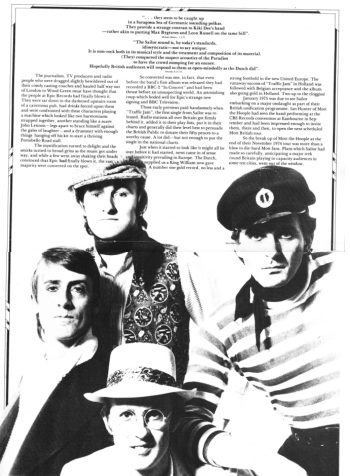
"...they
seem to be caught up in a Saragossa Sea of Germanic sounding
polkas. They provide a strange contrast to Kiki Dee's band -
rather akin to putting Max Bygraves and Leon Russell on the same
bill".
Melody
Maker, 1.3.75
"The
Sailor sound is, by today's standards, idiosyncratic - not to say
unique.
It is non-rock both in its musical style and the treatment and
compositions of its material. (They) conquered the suspect
acoustic of the Paradiso to have the crowd stomping for an
encore.
Hopefully British audiences will respond to them as open-mindedly
as the Dutch did".
Sounds,
9.11.74
The journalists, TV
producers and radio people who were dragged slightly bewildered
out of their comfy casting couches and hauled half way out of
London to Wood Green must have thought that the people at Epic
Records had finally blown it. They were sat down in the darkened
upstairs room of a cavernous pup, had drinks forced upon them and
were confronted with these characters playing a machine which
looked like two harmoniums strapped together, another standing
like a suave John Lennon - legs appart do brace himself against
the gales of laughter - and a drummer with enough things hanging
off his kitt to start a thriving Portobello Road stall.
The mystification turned to delight and the smirks turned to
broad grins as the music got under way, and while a few went away
shaking their heads convinced that Epic had finally blown
it, the vast majority were converted on the spot.
So converted was one, in fact, that even before the band's first
album was released they had recorded a BBC-2 "In
Concert" and had been thrust before an unsuspecting world.
An astonishing coup which boded well for Epic's strange new
signing and BBC Television.
Those early previwes paid handsomely when "Traffic
Jam", the first single from Sailor was released. Radio
stations all over Britain got firmly behind it, added it to their
pay-lists, put it in their charts and generally did their level
best to persuade the British Public to donate their fifty pences
to a worthy cause. A lot did - but not enough to put the single
in the national charts.
Just when it started to look like it might all be over before it
had started, news came in of sense and sensitivity prevailing in
Europe. the Dutch, who once supplied us a King William now gave
Sailor a hit. A number one gold record, no less and a strong
foothold in the new United Europe. The runaway success of
"Traffic Jam" in Holland was followed with Belgian
acceptance and the album also going in Holland. Two up to the
cloggies!
January 1975 was due to see Sailor embarking on a major onslaught
as part of their British unification programme. Ian Hunter of
Mott the Hoople had seen the band performing at the CBS Records
convention at Eastbourne in September and had been impressed
enough to invite them, there and then, to open the next scheduled
Mott British tour.
So the break up of Mott the Hoople at the end of their November
1974 tour was more than a blow to die-hard Mott fans. Plans which
Sailor had made so carefully, anticipating a major trek round
Britain playing to capacity audiences in some ren cities, went
out of the window.
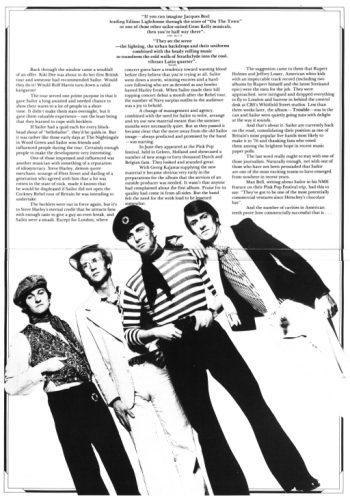
"If
you can imagine Jaques Brel leading Edison Lighthouse through the
score of 'On the town' or one of those other sailor-suited Gene
Kelly musicals, then you're half the way there".
NME
28.9.74
"They
set the scene - the lighting, the urban backdrops and their
uniforms combined with the heady rolling music to transform the
cold walls of Strathclyde into the cool, vibrant Latin
quater".
Sounds
Back through the
window came a windfall of an offer. Kiki Dee was about to do her
first British tour and someone had recommended Sailor. Would they
do it? Would Rolf Harris turn down a rabid kangaroo?
The tour served one prime purpose in that it gave Sailor a long
awaited and needed chance to show their wares to a lot of people
in a short time. It didn't make tham stars overnight, but it gave
them valuable experience - not at least being that they learned
how to 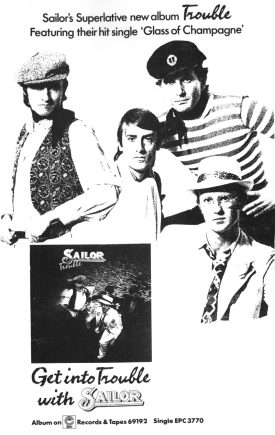 cope with
hecklers.
cope with
hecklers.
If Sailor had a quid each for every block-head shout of
"hello Sailor", they'd be quids in. But it was rather
like in those early days at The Nightingale in Wood Green and
Sailor won friends and influenced people during the tour.
Certainly enough people to make the development very interesting.
One of those impressed and influenced was another musician with
something of a reputation of indiosyncracy. Steve Harley, demon
quote merchant, scourge of Fleet Street and darling of a
generation who agreed with him that a lot was rotten in the state
of rock, made it known that he would be displeased if Sailor did
not open the Cockney Rebel tour of Britain he was intending to
undertake.
The hecklers were out in force again, but it's to Steve Harley's
eternal credit that he attracts fans with enough taste to give a
guy an even break, and Sailor were a smash. Except for London,
where concert goers have a tendency towarding wanting blood
before they believe that you're trying at all, Sailor went down a
storm, winning encores and a hardcore following wgo are as
devoted as any bowler hatted Harley freak. When Sailor made their
bill topping concert debut a month after the Rebel tour, the
number of Navy surplus outfits in the audience was a joy to
behold.
A change of management and agency, combined with the need for
Sailor to write, arrange and try out new material meant that the
summer months were necessarily quiet. But as they passed it
became clear that the move away from the old Sailor image -
always predicted and promised by the band - was starting.
In June they appeared at the Pink Pop festival, held in Geleen,
Holland and showcased a number of new songs to forty thousand
Dutch and Belgium fans. They looked and sounded great.
With Georg Kajanus supplying the new material it became obvious
very early in the preperations for the album that the services of
an outside producer was needed. It wasn't anyone had complained
about the first album. Praise for its quality had come in from
all sides. But the band felt the need for the work load to be
lessened somewhat.
The suggestion came to them that Rupert Holmes and Jeffrey
Lesser, American whizz kids with an impeccable track record
(including two albums by Rupert himself and the latest Streisand
epic) were the men for the job. They were approached, were
intrigued and dropped everything to fly to London and burrow in
behind the control desk at CBS's Whitfield Street studios. Less
than three weeks later, the album - Trouble -
was in the can and Sailor were quietly going nuts with delight at
the way it sounds.
And that's about it. Sailor are currently back on the road,
consolidating their position as one of Britain's most popular
live bands most likely to make it in '76 and thanking fans who
voted them among the brightest hope in recent music paper polls.
The last word really ought to stay with one of those journalists.
Naturally enough, not with one of those who have not been
persuaded that Sailor are one of the most exciting teams to have
emerged from nowhere in recent years.
Max Bell, writing about Sailor in his NME feature on their Pink
Pop Festival trip, had this to say: "They've got to be one
of the most potentially commercial ventures since Herschey's
chocolate bar".
And the number of cavaties in American teeth prove how
commercially successful that is...